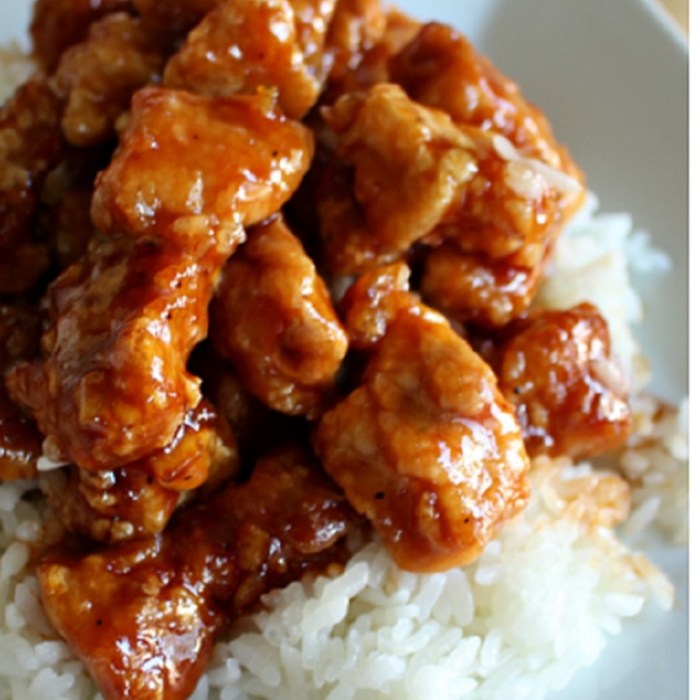Recipe for Orange Sauce for Chicken
Orange Chicken Sauce: A Culinary Exploration: Recipe For Orange Sauce For Chicken
Recipe for orange sauce for chicken – Orange chicken sauce, a vibrant and versatile condiment, transcends geographical boundaries, enriching a diverse array of dishes. Its origins, while not definitively pinpointed to a single culture or time period, are likely rooted in the fusion of Eastern and Western culinary traditions, showcasing the global exchange of flavors. The sauce’s key ingredients typically include orange juice, soy sauce, rice vinegar, and a touch of sweetness, often derived from sugar or honey.
This foundation provides a delightful balance of sweet, sour, and savory notes, readily adaptable to personal preferences.
Basic Orange Chicken Sauce Recipe
This recipe emphasizes fresh ingredients and simplicity. It’s easily adaptable for dietary needs.
Yields: Approximately 1 cup
Prep time: 5 minutes
Cook time: 10 minutes
Ingredients:
- 1/2 cup freshly squeezed orange juice
- 1/4 cup soy sauce (low sodium preferred)
- 2 tablespoons rice vinegar
- 2 tablespoons honey or maple syrup (for vegan option)
- 1 tablespoon cornstarch
- 1 teaspoon grated ginger
- 1/2 teaspoon garlic powder
- Pinch of red pepper flakes (optional)
Instructions:
- Whisk together orange juice, soy sauce, rice vinegar, honey/maple syrup, cornstarch, ginger, garlic powder, and red pepper flakes (if using) in a small saucepan.
- Cook over medium heat, stirring constantly, until the sauce thickens and comes to a simmer (about 8-10 minutes). The sauce should coat the back of a spoon.
- Remove from heat and let cool slightly before serving.
Vegan Variation: Substitute maple syrup for honey and ensure your soy sauce is vegan-friendly.
A vibrant orange sauce elevates simple chicken to a delightful dish. The key is balancing sweet and tart notes, perhaps using a touch of honey or orange zest. For a contrasting approach, consider the depth of flavor found in a rich tomato-based sauce; you might find inspiration in this excellent recipe for fresh tomato marinara sauce for techniques in building complex flavor profiles.
Returning to our orange sauce, remember to adjust the sweetness to your preference for the perfect complement to your chicken.
Variations in Orange Chicken Sauce Flavors

Source: cloudinary.com
The flavor profile of orange chicken sauce is highly customizable. Adjusting the balance of sweet, sour, and spicy elements, along with the addition of various spices and herbs, creates a wide range of taste experiences. The type of orange juice also plays a significant role.
Sweetness: Increasing the amount of honey or maple syrup enhances the sweetness. Using a sweeter orange juice, like mandarin orange juice, also contributes to a sweeter flavor.
Sourness: Adding more rice vinegar or lime juice increases the sourness. Using a more tart orange juice, like a less ripe orange, will also amplify the sour notes.
Spice: Incorporating more red pepper flakes, chili garlic sauce, or other chili-based ingredients will add heat. Freshly ground black pepper can add a subtle spiciness.
Herbs and Spices: Experimenting with herbs like cilantro or basil, or spices like five-spice powder or ground cloves, can introduce complex and unique flavor dimensions.
Orange Juice Type: Freshly squeezed orange juice offers a brighter, more intense flavor and aroma compared to bottled juice. Bottled juice can be more consistent in terms of sweetness and acidity.
Sauce Consistency and Thickening Techniques
Achieving the desired consistency is crucial for a successful orange chicken sauce. Cornstarch is a common thickening agent, but arrowroot powder offers a slightly clearer result. Simmering time significantly impacts the thickness.
Cornstarch/Arrowroot Powder: Mix the cornstarch or arrowroot powder with a small amount of cold water to create a slurry before adding it to the sauce. This prevents clumping.
Simmering Time: Longer simmering times result in a thicker sauce, but be mindful of overcooking, which can lead to a gummy texture.
Adjusting Consistency: If the sauce is too thick, add a little more orange juice or water, whisking constantly. If it’s too thin, simmer for a longer time, or create a fresh cornstarch slurry and add it gradually while stirring.
Serving Suggestions and Pairings
Orange chicken sauce complements a variety of dishes, offering a delightful balance of flavors. Its versatility extends beyond chicken to include tofu, fish, and even vegetables.
| Dish | Sauce Variation | Side Dish | Flavor Profile |
|---|---|---|---|
| Chicken Stir-fry | Classic | Steamed rice | Sweet, Sour, Savory |
| Tofu Scramble | Vegan | Quinoa | Sweet, Savory, Slightly Spicy |
| Baked Salmon | Reduced Sugar | Roasted Asparagus | Bright, Tangy |
| Vegetable Spring Rolls | Spicy | Peanut Sauce | Sweet, Sour, Spicy |
For attractive presentation, drizzle the sauce over the dish in a visually appealing manner, or serve it in a small bowl alongside the main course.
Storage and Shelf Life

Source: dishpulse.com
Proper storage is essential to maintain the quality and safety of leftover orange chicken sauce. Refrigeration and freezing are effective methods for extending its shelf life.
Refrigeration: Store leftover sauce in an airtight container in the refrigerator for up to 3-4 days.
Freezing: Pour the cooled sauce into freezer-safe containers, leaving some headspace for expansion. Frozen sauce can last for up to 2-3 months.
Reheating: Gently reheat the sauce over low heat, stirring frequently, to prevent scorching. Avoid boiling, as this can alter the consistency and flavor.
Visual Guide: Orange Chicken Sauce Preparation, Recipe for orange sauce for chicken
Observing the visual changes during sauce preparation provides valuable feedback on its progress. The color and texture shifts indicate the thickening process and readiness.
- Initial Mixing: The mixture appears initially thin and translucent, a light orange hue, with a slightly grainy texture from the cornstarch.
- Simmering: As the sauce simmers, it gradually thickens, becoming less translucent and developing a richer, more vibrant orange color. The grainy texture smooths out.
- Thickening: The sauce reaches its desired consistency when it coats the back of a spoon smoothly and leaves a distinct trail. The color deepens further, becoming a more intense, glossy orange.
Answers to Common Questions
Can I use frozen orange juice?
Yes, but fresh orange juice generally provides a brighter, more vibrant flavor. If using frozen, thaw it completely and measure accordingly.
What if my sauce is too thin?
Simmer the sauce for a longer period, or create a slurry of cornstarch and cold water, whisking it into the sauce until it reaches your desired consistency.
How long does the sauce last in the refrigerator?
Properly stored in an airtight container, the sauce should last for 3-4 days in the refrigerator.
Can I freeze the orange chicken sauce?
Yes, you can freeze the sauce for up to 2 months. Allow it to thaw completely in the refrigerator before reheating.













